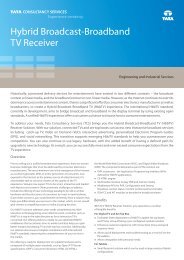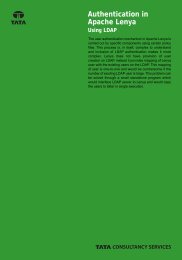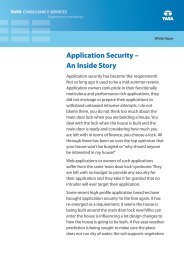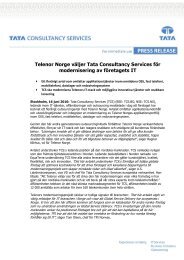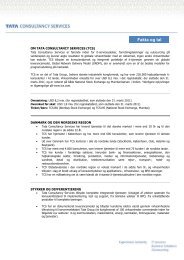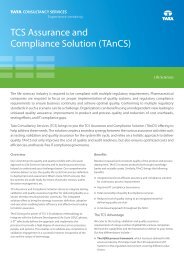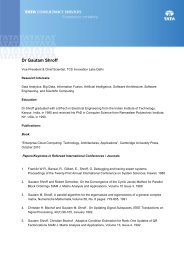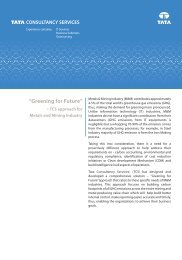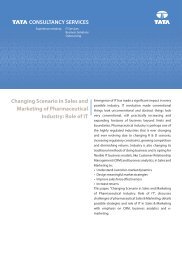TCS Corporate Sustainability Report 2010-11 - Tata Consultancy ...
TCS Corporate Sustainability Report 2010-11 - Tata Consultancy ...
TCS Corporate Sustainability Report 2010-11 - Tata Consultancy ...
You also want an ePaper? Increase the reach of your titles
YUMPU automatically turns print PDFs into web optimized ePapers that Google loves.
All these initiatives have helped <strong>TCS</strong> reduce its energy consumption by 7.75% over FY <strong>2010</strong><br />
and 22.80% over baseline year FY 2008.<br />
Lastly, total fuel consumption by company owned vehicles in FY 20<strong>11</strong> was <strong>11</strong>2,123 liters of<br />
Petrol and 177, 625 liters of Diesel. The total direct energy consumption by primary energy<br />
sources is 310,324 GJ (from fuel consumption in owned vehicles, diesel consumption in<br />
Diesel Generators, LPG combustion in canteen kitchens).<br />
Water Performance<br />
Fresh water consumed at <strong>TCS</strong> comes from municipality supply, borewells, tanker supply and<br />
a small fraction of packaged drinking water procured at some sites. A source-wise breakup<br />
of the 1.6 million kL of water consumed in FY 20<strong>11</strong> is shown in Figure . Other than the<br />
groundwater aquifers that the on-premise borewells and tankers tap into, no other water<br />
sources are impacted.<br />
Tanker<br />
27%<br />
Borewell<br />
23%<br />
Bottle<br />
1%<br />
Figure 49 Freshwater consumption by source<br />
Municipal<br />
49%<br />
Some of the steps taken to reduce fresh water consumption at <strong>TCS</strong> include:<br />
n Dual flushing system in toilets<br />
n Taps with variable output and sensors<br />
n Drip irrigation system<br />
n Throttling of valves<br />
n Regular maintenance of water pumps<br />
n Sewage treatment plants where feasible; recycled water for A/C cooling tower make-up,<br />
flushing and gardening<br />
n Employee engagement and education through awareness drives<br />
As an outcome, per capita water consumption decreased YoY by <strong>11</strong>.85% in FY 20<strong>11</strong>.<br />
See Figure 50.<br />
68



